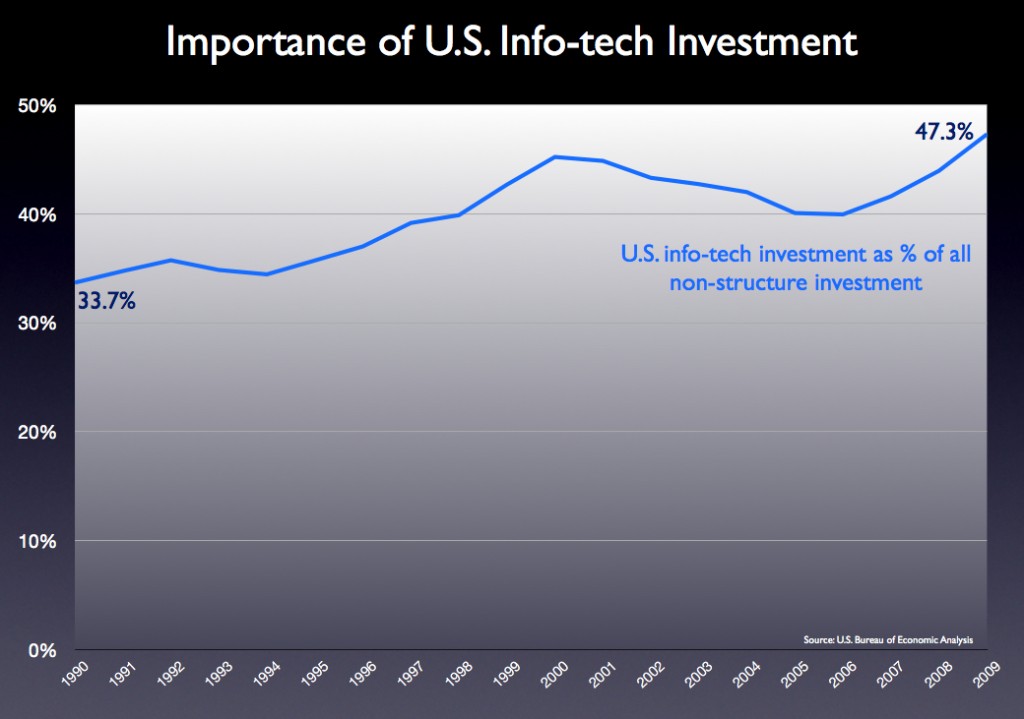If it’s true, as Nick Schulz notes, that FCC Commissioner Copps and others really think Chairman Genachowski’s proposal today “is the beginning . . . not the end,” then all bets are off. The whole point is to relieve the overhanging regulatory threat so we can all move forward. More — much more, I suspect — to come . . . .
FCC Proposal Not Terrible. Internet Likely to Survive and Thrive.
The FCC appears to have taken the worst proposals for regulating the Internet off the table. This is good news for an already healthy sector. And given info-tech’s huge share of U.S. investment, it’s good news for the American economy as a whole, which needs all the help it can get.

In a speech this morning, FCC chair Julius Genachowski outlined a proposal he hopes the other commissioners will approve at their December 21 meeting. The proposal, which comes more than a year after the FCC issued its Notice of Proposed Rule Making into “Preserving the Open Internet,” appears mostly to codify the “Four Principles” that were agreed to by all parties five years ago. Namely:
- No blocking of lawful data, websites, applications, services, or attached devices.
- Transparency. Consumers should know what the services and policies of their providers are, and what they mean.
- A prohibition of “unreasonable discrimination,” which essentially means service providers must offer their products at similar rates and terms to similarly situated customers.
- Importantly, broadband providers can manage their networks and use new technologies to provide fast, robust services. Also, there appears to be even more flexibility for wireless networks, though we don’t yet know the details.
(All the broad-brush concepts outlined today will need closer scrutiny when detailed language is unveiled, and as with every government regulation, implementation and enforcement can always yield unpredictable results. One also must worry about precedent and a new platform for future regulation. Even if today’s proposal isn’t too harmful, does the new framework open a regulatory can of worms?)
So, what appears to be off the table? Most of the worst proposals that have been flying around over the last year, like . . .
- Reclassification of broadband as an old “telecom service” under Title II of the Communications Act of 1934, which could have pierced the no-government seal on the Internet in a very damaging way, unleashing all kinds of complex and antiquated rules on the modern Net.
- Price controls.
- Rigid nondiscrimination rules that would have barred important network technologies and business models.
- Bans of quality-of-service technologies and techniques (QoS), tiered pricing, or voluntary relationships between ISPs and content/application/service (CAS) providers.
- Open access mandates, requiring networks to share their assets.
Many of us have long questioned whether formal government action in this arena is necessary. The Internet ecosystem is healthy. It’s growing and generating an almost dizzying array of new products and services on diverse networks and devices. Communications networks are more open than ever. Facebook on your BlackBerry. Netflix on your iPad. Twitter on your TV. The oft-cited world broadband comparisons, which say the U.S. ranks 15h, or even 26th, are misleading. Those reports mostly measure household size, not broadband health. Using new data from Cisco, we estimate the U.S. generates and consumes more network traffic per user and per capita than any nation but South Korea. (Canada and the U.S. are about equal.) American Internet use is twice that of many nations we are told far outpace the U.S. in broadband. Heavy-handed regulation would have severely depressed investment and innovation in a vibrant industry. All for nothing.
Lots of smart lawyers doubt the FCC has the authority to issue even the relatively modest rules it outlined today. They’re probably right, and the question will no doubt be litigated (yet again), if Congress does not act first. But with Congress now divided politically, the case remains that Mr. Genachowski’s proposal is likely the near-term ceiling on regulation. Policy might get better than today’s proposal, but it’s not likely to get any worse. From what I see today, that’s a win for the Internet, and for the U.S. economy.
— Bret Swanson
“In the Matter of Preserving the Open Internet”
Here were my comments in the FCC’s Notice of Proposed Rule Making on “Preserving the Open Internet” — better known as “Net Neutrality”:
A Net Neutrality regime will not make the Internet more “open.” The Internet is already very open. More people create and access more content and applications than ever before. And with the existing Four Principles in place, the Internet will remain open. In fact, a Net Neutrality regime could close off large portions of the Internet for many consumers. By intruding in technical infrastructure decisions and discouraging investment, Net Neutrality could decrease network capacity, connectivity, and robustness; it could increase prices; it could slow the cycle of innovation; and thus shut the window to the Web on millions of consumers. Net Neutrality is not about openness. It is far more accurate to say it is about closing off experimentation, innovation, and opportunity.
Reading 15,000 documents so you don’t have to
For those of you not wishing to sift through 15,000 comments submitted to the FCC for its Net Neutrality proposed rule making, let me recommend what — so far — is the best technical filing I’ve read. It comes from Richard Bennett and Rob Atkinson of the Information Technology Innovation Foundation.
Also very useful is a new post by George Ou on content delivery and paid peering, with important policy implications.
These are among the least discussed — but most important — items in the whole Net Neutrality debate.
Separately, from the FCC’s “Open Internet” meeting at MIT last week, see summaries of each panelist’s remarks: Opening Presentations, Panel 1, Panel 2.

